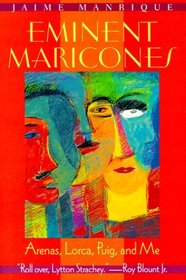Search -
Eminent Maricones: Arenas, Lorca, Puig, and Me (Living Out, Gay and Lesbian Autobiographies)
Eminent Maricones Arenas Lorca Puig and Me - Living Out, Gay and Lesbian Autobiographies
Author:
"Where Manrique's tale differs from others is in its unabashed and sensitive treatment of sexuality. One reads his autobiographical account with pleasure and fascination."-Jose Quiroga, George Washington University "Manrique's voice is wise, brave, and wholly original. This chronicle of self- discovery and literary encounters is heartening an... more »
Author:
"Where Manrique's tale differs from others is in its unabashed and sensitive treatment of sexuality. One reads his autobiographical account with pleasure and fascination."-Jose Quiroga, George Washington University "Manrique's voice is wise, brave, and wholly original. This chronicle of self- discovery and literary encounters is heartening an... more »
ISBN-13: 9780299161804
ISBN-10: 0299161803
Publication Date: 7/1999
Pages: 116
Rating: ?
ISBN-10: 0299161803
Publication Date: 7/1999
Pages: 116
Rating: ?
0 stars, based on 0 rating
Publisher: University of Wisconsin Press
Book Type: Hardcover
Other Versions: Paperback
Members Wishing: 3
Reviews: Amazon | Write a Review
Book Type: Hardcover
Other Versions: Paperback
Members Wishing: 3
Reviews: Amazon | Write a Review
Genres:
- Biographies & Memoirs >> Arts & Literature >> Authors
- Biographies & Memoirs >> General
- Biographies & Memoirs >> Specific Groups >> General
- LGBTQ+ Books >> Biographies & Memoirs >> Gay
- LGBTQ+ Books >> Biographies & Memoirs >> General
- LGBTQ+ Books >> Nonfiction >> General




